- About Us
- Columns
- Letters
- Cartoons
- The Udder Limits
- Archives
- Ezy Reading Archive
- 2024 Cud Archives
- 2023 Cud Archives
- 2022 Cud Archives
- 2021 Cud Archives
- 2020 Cud Archives
- 2015-2019
- 2010-2014
- 2004-2009
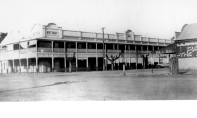 |
Harry Corones, 1883-1972 |
On 14 June 1965 people poured into the Hotel Corones in Charleville, Queensland.
“The barmaids were run off their feet, the telephones ran hot and the local telegraph boy nearly wore out his bike”. Everyone was celebrating as Harry Corones (or “Poppa” to all who knew him) had been made a Member of the Order of the British Empire for “his remarkable services to the people of Western Queensland”.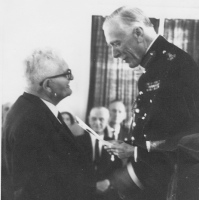
Harry (Haralambos) Corones was born in the village of Frylingianika, Kythera on 17 September 1883 to Panayiotis Coroneos, a fisherman, and his wife Stamatia, a member of the large extended Frylingos family.
After some years of basic education and two years’ military service as a first-aid-orderly, the family agreed that Harry should emigrate as there were few opportunities on the island. So on 10 August 1907, without knowing any English and with his twelve-year-old nephew Demetrios (Jim), he landed in Sydney for a better life.
Harry’s immediate concern was to find work. Leaving Jim to look after the luggage, he went to find a Kytherian, Mr Aroney, who gave him work in his fish shop. It was a hard life in Sydney with Harry working extremely long hours cleaning fish and opening oysters, with Jim working there on the weekends.
After a year, Harry and Jim moved to Brisbane where there were relatives from his mother’s side. The Frylingos (Freeleagus) brothers gave Harry a job in their oyster saloon. Harry was determined to start his own business and decided on Charleville, an inland town in southwest Queensland, 670 kilometres from Brisbane where an empty cafe, owned by a Greek named Theo Comino, was for sale. With a loan from the Freeleagus brothers, Harry bought the cafe and in l909, he and Jim set off for Charleville which was a remote, hot and dusty thriving town with saw mills, a meatworks and a few small factories. It was an important rail terminal and a main stopping point for bullock trains, camel caravans, and the many drovers who were moving stock.
Harry’s cafe needed work, but he offered good service, good food and warm hospitality. He soon went into partnership with a fellow-Greek, Megalocominos, in a café where he met Paddy Cryan, a salesman from a Brisbane brewery. Paddy urged Harry to take on the lease of the vacant Hotel Charleville. He was reluctant because he had no hotel experience and little money, but Cryan assured him that the brewery would finance itself and train him in the business. On 7 October 1912 Harry signed a five-year lease at £6 per week, marking the beginning of his career as a hotelier – the first Greek hotelier in Australia.
In 1914 Harry married Eftyhia Phocas in Sydney, but his joy was mixed with misfortune, for in his absence the hotel burnt down. He returned to Charleville with his new wife and rebuilt the hotel, with a ten-year lease at £540 per year. The new hotel was bigger and more luxurious but not without its unusual aspects. For example, boundary riders used to ride their horses into the bar and at times there would be almost as many horses as people, until Harry changed the doors making them too narrow for a horse and rider to pass through!
In 1915 with three Australians, Harry opened Charleville’s first cinema, the Excelsior, at the rear of the hotel. They brought silent movies, vaudeville acts from Sydney and Brisbane, and an electric lighting plant Harry had imported from London – an amazing innovation for the outback in those days. In June he took a ten-year lease on the Paris Cafe in the same block, which he eventually sub-let to his cousin Peter Locos in 1921.
Over the years Harry’s hard work and popularity were recognised by invitations to serve on the Charleville Hospital Board, the Ambulance Centre Committee and the Fire Brigade Board, yet he wanted to do more to help end the town’s isolation. His inspiration came in 1919 when, on a flight from England to Australia, Sir Keith and Sir Ross Smith made a landing at Charleville for fuel and repairs. Harry entertained the aviators while repairs were made. The spectacle of a plane landing at Charleville fired Harry’s imagination and he became passionately interested in Australia’s aviation industry.
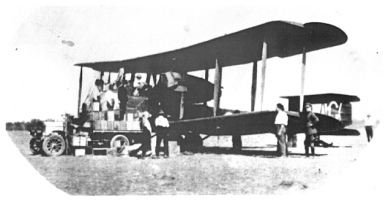
When Sir Hudson Fysh and others formed an airline named Qantas (Queensland and Northern Territory Aerial Services), several meetings were held in Harry’s hotel. It was at one meeting that Harry suggested, inspired by the classical Greek mythology, they give the Greek names Perseus, Pegasus, Hermes, Atalanta, and Heppomenes to five of their first seven aircraft. In 1920 Harry Corones became one of the original shareholders of the airline with one hundred one-pound shares. Qantas’ first scheduled service was from Charleville to Cloncurry on 2 November 1922, and picnic hampers sent out to the planes became a regular part of Harry’s life. Later in 1971 Sir Hudson Fysh wrote to Corones: “I want to see you again, great and long friend and supporter that you have been, and to recall some of the old times long passed when the world was younger, simpler, and you used to bring out the morning tea. Yes, Qantas’ first caterer”.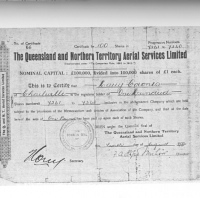
In 1921, Harry and Jim bought a single-storey wooden hotel for £2,935 in Quilpie a small rail terminal town with a few shops, police station, court house, small hospital and some houses, 210 kilometres to the west in opal country. Jim ran it and his brother, known as “young Harry”, came over to join him.
After the Hotel Charleville lease ran out in 1924, Harry and Jim purchased the Norman Hotel, a ramshackle place from the 1890s. Harry had the prize-winning architect William Hodgen help him transform it into the Hotel Corones, the fulfilment of Harry’s dreams. Using local labour, the grand hotel took five years to complete. 1929 proved to be a year of success and disappointment in Quilpie, however. Harry and Jim built the Imperial Hotel, Quilpie’s first two-storey wooden structure and the first to have electricity, but soon the hotel and cinema burnt down. They immediately rebuilt the hotel with two floors in brick and concrete, making it the first building constructed in anything other than wood, becoming known affectionately as “The Brick”.
After five years of planning and construction, in 1929 the magnificent two-storey white Hotel Corones with its sixty-three metre frontage rose “phoenix-like on the site of the old Norman Hotel”. Harry now had a hotel that no other in the State surpassed and no other in a country town could equal. Built at a cost of £50,000, it contained a lounge, writing room, a dining-room for a 150 people, a private and a public bar, a barber’s shop and a magnificent ballroom for 320, with forty single and double bedrooms and bathrooms with French doors opening to a veranda. This luxurious hotel, of which he used to say “I built it, and the bank”, became known for its elegance, luxury and fine service. Harry’s personality added the crowning touch to the hotel’s reputation.
Many distinguished guests stayed at the hotel, one of the earliest being the aviator Amy Johnson who made Charleville a stopping point on her epic flight from Britain to Australia in 1930. Other guests included the aviators Sir Charles Kingsford Smith, the Wright brothers and Nancy Bird, the then Governor of Queensland Sir Leslie Orme Wilson, judges, politicians (including Gough Whitlam), the much-loved English singer Gracie Fields, pop stars like Johnny O’Keefe, and even members of the royal family such as the Duke of Gloucester, who permitted Harry to use the royal insignia with “Under Vice Regal Patronage” on the hotel’s letter¬head.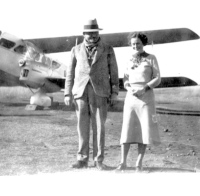
It was Harry’s sense of humour which endeared him to guests and townsfolk alike. One enduring story concerns Harry’s somewhat shaky grasp of written English. One of Harry’s guests, a circuit judge from Brisbane stayed at the hotel every year and would go duck shooting with him. After one visit he had left his gun behind, so Harry telephoned him. The line was very poor and the judge could not understand what Harry was saying. “Spell it” the judge said, exasperated. So Harry spelt “G for Jesus, U for onion, N for pneumonia”!
In 1935 with a number of hotels and other businesses, Harry and Jim formed a company, Hotels Pty Ltd., later Corones Hotels Pty Ltd. with Harry as Managing Director. Harry also maintained his support for Qantas and took over a disused hangar converting it into a dining-room for passengers, with all the elegance of his hotel dining room. The end of the 1930s and the period of World War II saw business boom with an American Air Force Base. Harry welcomed the troops, holding dances in the hotel. The American troops called Harry “Poppa” and Eftyhia “Nana”.
After the war the company flourished and in 1948 bought the Hotel Charleville, but the rural economy suffered badly during the drought of the 1960s.The local pastoral industry and the Corones empire were hit hard, especially in 1966 with the death of his dearly loved nephew Jim. Harry lost his closest friend and partner.
Business was not Harry’s sole interest in life. He was a devoted family man and a generous benefactor of various causes in the town. His service to the Ambulance Board lasted from 1919 to 1958, to the Fire Brigade Board for over twenty-five years, and on the Hospital Board for fifty-three years. He was chairman of the Board’s Works Committee and the nurses’ quarters were officially named the Harry Corones Block. Harry was also a great supporter of local sporting groups. He was a foundation member and developer of the Charleville golf club and the bowling club, financed a local basketball team, and was a foundation patron of the football club.
At the grand old age of eighty-eight Harry Corones passed away on 22 March 1972. A huge procession accompanied his coffin to the local cemetery. Two years later Eftyhia followed and was buried next to him.
The dinner bell beside the entrance of the Hotel Corones dining-room has never been rung since. The Hotel still stands as a memorial to Harry and his wife. Painstakingly restored after the 1990 floods, it was recognised by the National Trust of Queensland in 1993 and in May 1997 placed on the Heritage List. Tours through the Hotel Corones mean that the vision and the high standards of Harry Corones, who built an unequalled hotel in rural Queensland, can still be appreciated, as can Harry himself the man known as “the uncrowned king of the West”.
The full version of this article and the photographs can be found in the author’s book In the Wake of Odysseus: Portraits of Greek Settlers in Australia, 1997.
Dr. George Kanarakis is an Adjunct Professor in the School of Humanities and Social Sciences, Charles Sturt University in Australia.
